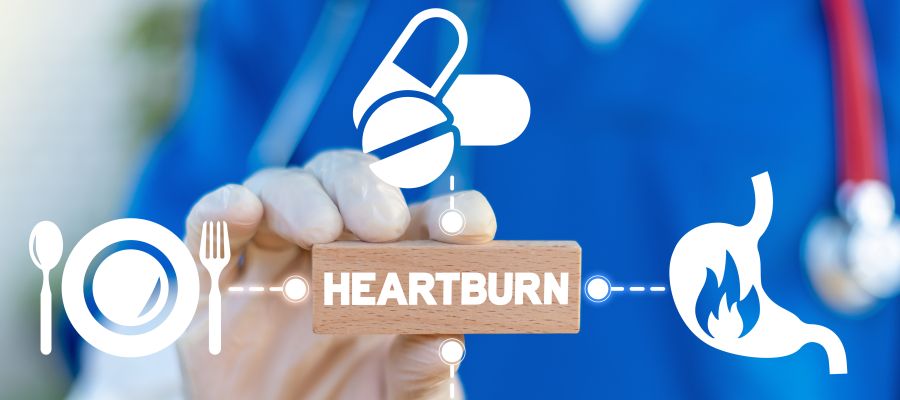Heartburn Treatment Options: Effective Solutions for Relief
Heartburn often causes a burning sensation in the chest, sour taste in the mouth, and discomfort after eating or lying down. Symptoms may include chest pain, bloating, or frequent throat clearing. At Digestive Disease Care (DDC), our team of board-certified doctors provides comprehensive care to relieve and manage these symptoms. For more information, contact us today or schedule an appointment online. We have convenient locations to serve you in Babylon NY, East Setauket NY, Forest Hills NY, Jericho NY, Lake Success NY, Melville NY, Mineola NY, Massapequa NY, New Hyde Park NY and Riverhead NY.


Table of Contents:
What is heartburn, and what causes it?
What are the most common symptoms of heartburn?
What lifestyle changes can help reduce heartburn symptoms?
What are the most common treatment options for heartburn?
Heartburn is a common digestive symptom characterized by a burning sensation in the chest or throat. It occurs when stomach acid backs up into the esophagus—the tube that carries food from your mouth to your stomach. This acid reflux irritates the lining of the esophagus, leading to discomfort. Heartburn is often associated with gastroesophageal reflux disease (GERD), a chronic condition that may require long-term management.
Common Causes of Heartburn Include:
• Eating large meals or lying down right after a meal
• Consuming spicy, fatty, or acidic foods
• Drinking coffee, alcohol, or carbonated beverages
• Smoking
• Being overweight or pregnant
• Wearing tight-fitting clothing around the abdomen
• Certain medications, like NSAIDs or muscle relaxants
• Hiatal hernia (a condition where part of the stomach pushes into the chest)
Heartburn can vary in intensity and may be occasional or frequent. Occasional heartburn is typically not a cause for concern, but persistent or severe episodes may signal an underlying condition like GERD. If left unmanaged, chronic acid exposure can lead to complications such as esophagitis or esophageal strictures. Understanding what triggers heartburn and making appropriate changes can significantly reduce the frequency and intensity of symptoms. If symptoms persist despite lifestyle adjustments, it may be advisable to consult a healthcare provider for further evaluation.
Heartburn symptoms can range from mild to severe and are typically most noticeable after meals, when lying down, or during the night. These symptoms occur when acidic stomach contents reflux into the esophagus, causing irritation and discomfort.
Common Symptoms of Heartburn Include:
• A burning sensation in the chest, usually after eating
• Chest discomfort that may worsen when bending over or lying down
• A sour or bitter taste in the mouth
• Difficulty swallowing or a feeling of food stuck in the throat
• A persistent cough or throat clearing
• Hoarseness or a sore throat
• A sensation of pressure or fullness behind the breastbone
• Nausea or an upset stomach
• Regurgitation of food or liquid
Symptoms often mimic other conditions, such as a heart attack, especially when the chest pain is intense. However, heartburn is usually relieved by medications and tends to occur after eating, whereas heart-related symptoms are often triggered by exertion. Chronic heartburn or frequent symptoms may indicate GERD and should not be ignored. Monitoring symptom patterns, such as frequency and triggers, is useful for diagnosis and effective treatment. If over-the-counter remedies are ineffective or symptoms worsen, it’s important to seek medical advice to rule out more serious conditions and receive appropriate care.
Many people can manage and reduce heartburn symptoms through simple lifestyle modifications. These changes are especially effective for those with mild or occasional symptoms and can also complement medical treatment for individuals with more persistent heartburn.
Helpful Lifestyle Changes Include:
• Eat smaller, more frequent meals to avoid overloading the stomach.
• Avoid trigger foods such as spicy dishes, citrus fruits, tomatoes, chocolate, and fatty or fried items.
• Limit caffeine and alcohol intake as they can relax the lower esophageal sphincter.
• Stop smoking, which weakens the muscle that keeps stomach acid out of the esophagus.
• Maintain a healthy weight, since excess weight puts pressure on the abdomen and increases reflux.
• Stay upright after eating for at least two to three hours before lying down.
• Raise the head of your bed by 6 to 8 inches to reduce nighttime reflux.
• Wear loose-fitting clothing, especially around the waist.
• Drink water instead of carbonated or sugary beverages.
Tracking your diet and symptoms can help identify individual triggers. These lifestyle changes are often the first step recommended by healthcare providers and can lead to significant improvement in heartburn severity and frequency. If symptoms continue despite these measures, it may be time to consult a doctor for additional treatment options.
Heartburn is commonly managed through a combination of lifestyle adjustments and medications that target stomach acid. Among the most commonly used medications are antacids, which provide fast relief by neutralizing excess stomach acid already present in the stomach. H2 receptor antagonists help reduce the amount of acid the stomach produces over several hours, providing longer-lasting relief for those with more frequent symptoms.
These medications can be used individually or as part of a broader treatment plan, depending on symptom severity and frequency. Antacids are typically taken as needed for occasional discomfort, while H2 blockers may be used daily for more consistent control. Lifestyle changes such as avoiding trigger foods, eating smaller meals, maintaining a healthy weight, and staying upright after eating also play a crucial role in managing heartburn. If symptoms continue despite these measures, consulting with a healthcare provider is essential to evaluate the possibility of underlying conditions like GERD and to determine the most appropriate course of care.
At Digestive Disease Care (DDC), we offer personalized solutions to help manage and relieve heartburn symptoms. Our team uses proven diagnostic tools and targeted treatment plans to address your specific needs. If you’re suffering from frequent or severe heartburn, visit us for expert evaluation and care. For more information, contact us today or schedule an appointment online. We have convenient locations to serve you in Babylon NY, East Setauket NY, Forest Hills NY, Jericho NY, Lake Success NY, Melville NY, Mineola NY, Massapequa NY, New Hyde Park NY and Riverhead NY.

Check Out Our 5 Star Reviews


Additional Services You May Like

Additional Services You May Like
- Abdominal Pain
- Acid Reflux
- Barretts Esophagus
- Bloating
- Capsule Endoscopy
- Celiac Disease
- Colon Cancer Screening
- Colonoscopy
- Constipation
- Crohns Disease
- Diarrhea
- Diverticulitis
- Esophageal PH Monitoring
- Fatty Liver
- Fibroscan
- Gallstones
- Gastroenterologist
- Gastric Chest Pain
- Gluten Intolerance
- Hemorrhoid
- Hemorrhoid Banding
- Hepatitis
- Irritable Bowel Syndrome
- Lactose Intolerance
- Pancreatitis
- Polyps
- Rectal Bleeding
- Stomach
- Ulcerative Colitis
- GI Urgent Care





